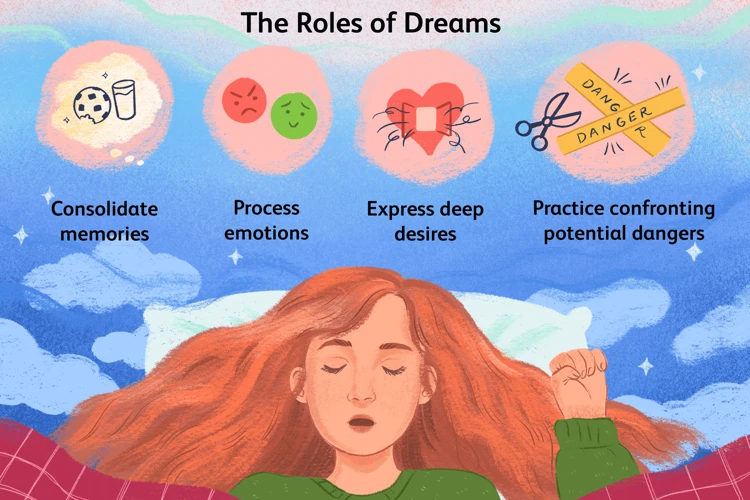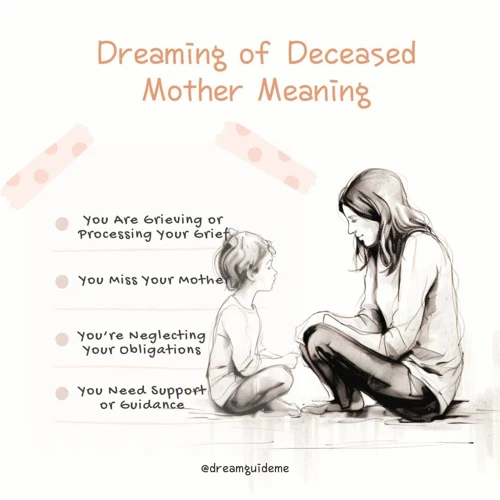Unraveling the Mystery: Why Do We Dream About Deceased Loved Ones?
Dreams have long fascinated and perplexed us, serving as a doorway to the subconscious realm of our minds. One of the most enigmatic aspects of dreaming is the occurrence of vivid and emotional experiences involving departed loved ones. In this article, we delve into the depths of this phenomenon, seeking to understand the meaning and significance behind these dream encounters. From psychological and spiritual perspectives to scientific and symbolic explanations, we explore the various theories and insights that shed light on why we dream about those who have passed on. Whether you have personally experienced these dreams or are curious about their origins, join us as we embark on a journey of exploration and self-discovery.
Understanding Dreams

Understanding Dreams: Dreams have long been a subject of fascination, eluding a concrete definition. They are a mysterious realm where our subconscious mind comes alive, presenting a rich tapestry of images, emotions, and experiences. Dreams can be vivid and lifelike, transporting us to different times, places, and even dimensions. While dreaming, we often suspend our grip on reality, allowing our deepest desires, fears, and memories to surface. The complex nature of dreams makes it challenging to pin down a singular meaning, as they can vary greatly from person to person. Despite their elusiveness, dreams hold significant value in our lives, offering a window into our inner workings and providing a platform for exploration, healing, and self-understanding.
1. What are dreams?
- Transient and Intangible: Dreams are transient and intangible experiences that occur during our sleep. They are a product of our subconscious mind, manifesting as a collection of thoughts, emotions, and sensations.
- Storytellers of the Mind: Dreams have a narrative quality, often presenting themselves in the form of a story or sequence of events. They can be fragmented and disjointed, with scenes transitioning abruptly.
- Multisensory Impressions: Dreams engage our senses, allowing us to see, hear, touch, taste, and smell within the dream space. These sensations can be vivid and lifelike, blurring the line between imagination and reality.
- Symbolic Language: Dreams often communicate through symbolism, using abstract images, metaphors, and allegories. Deciphering the symbolic language of dreams requires personal interpretation and understanding.
- Unconscious Desires and Fears: Dreams provide an outlet for our deepest desires, fears, and unresolved emotions. They serve as a medium through which our subconscious mind processes and explores these inner complexities.
2. The significance of dreams
The significance of dreams:
– Dreams serve as a gateway to our subconscious mind, allowing us to tap into hidden thoughts, feelings, and desires.
– They provide a means of processing and integrating our daily experiences and emotions, helping us make sense of the world around us.
– Dreams can offer insights into unresolved conflicts or issues that we may not be consciously aware of, giving us the opportunity for self-reflection and personal growth.
– They have been linked to problem-solving and creative thinking, as the mind continues to work on challenges and puzzles even while we sleep.
– Dreams can also act as a form of emotional release, allowing us to express and process intense emotions in a safe and cathartic way.
– Some theories suggest that dreams may have evolutionary significance, playing a role in survival instincts and memory consolidation.
– Dreams hold a profound significance in our lives, offering a multifaceted lens through which we can better understand ourselves and the world we inhabit.
Dreaming About Departed Loved Ones

Dreaming About Departed Loved Ones: One of the most profound and poignant types of dreams is when we encounter departed loved ones in our sleep. These dreams can evoke a wide range of emotions, from joy and comfort to sadness and longing. Many individuals report having vivid and realistic experiences where they see, talk to, or even touch their deceased loved ones. These dream encounters often carry a deep sense of connection and can leave a lasting impact on the dreamer. While the exact reasons behind these dreams remain elusive, several theories attempt to unravel this mysterious phenomenon. Whether they are a manifestation of our emotional bonds, a means of communication from the other side, or a reflection of our internal processing, dreaming about departed loved ones holds a profound significance in our journeys of grief, healing, and remembrance.
3. Common experiences
- Visitation dreams: Many people report having dreams where they are visited by their deceased loved ones. These dreams often feel incredibly real, with the presence of the departed one being vivid and palpable.
- Conversations: Dreams about departed loved ones may involve conversations, allowing for a sense of communication and connection. These conversations can range from simple exchanges to more in-depth discussions about unresolved issues or imparting guidance.
- Symbols and signs: Departed loved ones may appear in dreams through symbols or signs that hold personal significance. These symbols can include objects, animals, or even specific locations that carry emotional weight for both the dreamer and the deceased.
- Reliving memories: Dreams often serve as a platform for reliving cherished moments and memories with departed loved ones. These dreams can provide a sense of comfort and nostalgia, allowing the dreamer to experience the presence of their loved one once more.
- Emotional experiences: Dreams about deceased loved ones are often emotionally charged, evoking feelings of love, grief, longing, or even forgiveness. These dreams can provide a cathartic release and offer solace during the grieving process.
4. Emotional connections
Emotional connections: Dreaming about deceased loved ones often involves strong emotional connections. These dreams can evoke intense feelings of love, longing, joy, or even sadness and grief. The emotional depth of these dream experiences reflects the bond we had with our departed loved ones in waking life. Through dreams, we may have the opportunity to rekindle or explore unresolved emotions, reconcile conflicts, or simply cherish the memories. These emotional connections in dreams can provide solace, comfort, and a sense of continued connection to those who have passed away.
5. Message from the other side
5. Message from the other side: Dreams about deceased loved ones can sometimes be interpreted as messages from the other side. Many people believe that their departed loved ones communicate with them through dreams to provide comfort, guidance, or closure. These dreams may contain powerful symbolism or specific messages that are meant to convey a deeper meaning. It is important to approach these dreams with an open mind and pay attention to the emotions and symbols present. Some individuals may experience vivid dreams where they are able to have conversations with their loved ones, while others may receive signs or symbols that hold personal significance. These dream messages can offer a sense of connection and reassurance, providing solace and closure to those who are grieving.
Psychological and Spiritual Perspective

Psychological and Spiritual Perspective: When it comes to dreaming about departed loved ones, both psychological and spiritual perspectives offer insight into this profound phenomenon. From a psychological standpoint, dreaming about deceased loved ones can be seen as a way for our minds to process grief and loss. Dreams provide a safe space to explore and navigate the complex emotions associated with their passing. These dreams may also serve as an opportunity for emotional healing and closure. On the other hand, from a spiritual perspective, dreaming about departed loved ones can be seen as a form of connection and communication from the other side. Some believe that these dreams are messages or visits from the spirits of our loved ones, providing guidance, comfort, or closure. These perspectives intertwine, offering different lenses through which we can interpret and find meaning in our dream experiences with departed loved ones.
6. Dealing with grief
6. Dealing with grief:
– Expressing emotions: Dreaming about deceased loved ones can be a way for individuals to process and confront their grief. Dreams provide a safe space where suppressed emotions can be expressed and released, allowing individuals to explore their feelings of loss and sadness.
– Seeking closure: Dreams about departed loved ones can also serve as a means of seeking closure. They may provide an opportunity for individuals to say goodbye, ask for forgiveness, or receive reassurance from their loved ones, helping to facilitate the healing process.
– Connecting with memories: Dreams offer a bridge to cherished memories, allowing individuals to relive moments and experiences shared with their departed loved ones. This connection can bring comfort and a sense of presence, helping to keep their memory alive.
– Finding support: Dreams can act as a source of support during the grieving process. They may provide guidance, comfort, or a sense of assurance that the departed loved one is at peace. Sharing these dreams with supportive individuals, such as friends, family, or therapists, can provide additional support and validation for the grieving individual.
– Continuing bonds: Dreams can also enable individuals to maintain a sense of connection and bond with their departed loved ones. These dreams can serve as a reminder that the love and memories shared continue to live on, providing solace and a sense of ongoing presence.
7. Spiritual connections
While dreams about departed loved ones can have psychological explanations, they can also be seen from a spiritual perspective. Many believe that these dreams are a result of spiritual connections with the deceased. In these dreams, individuals may feel a strong presence, guidance, or comfort from their departed loved ones. Some interpret these dreams as messages from the other side, allowing for continued bonds and communication. Spiritual connections in dreams can provide solace, reassurance, and a sense of peace, helping the dreamer navigate the grieving process and find closure. These dreams are seen as a reminder that even in death, the bond with loved ones transcends physical limitations, offering comfort and spiritual guidance.
Scientific and Psychological Explanations

Scientific and Psychological Explanations: While dreams about deceased loved ones hold deep personal significance, scientific and psychological explanations offer insights into the underlying mechanisms behind these experiences. From a scientific perspective, dreaming is believed to be a result of the brain’s activities during sleep, where memories, emotions, and neural connections intertwine. It is suggested that dreams about departed loved ones may stem from the impact of their loss on our subconscious mind, as well as the deep emotional bonds we formed with them. Psychologically, dreams serve as a way to process unresolved emotions and grief, allowing us to delve into our unconscious thoughts and feelings regarding the loss of our loved ones. These dreams may offer a symbolic representation of our emotions and memories, providing a therapeutic outlet for healing and closure. The scientific and psychological viewpoints intertwine to offer a multifaceted understanding of why we dream about departed loved ones, acknowledging the intricate interplay between our minds, emotions, and the mysteries of the human psyche.
8. Processing unresolved emotions
Processing unresolved emotions: Dreams about deceased loved ones can often be a way for our subconscious to process unresolved emotions surrounding their passing. These dreams provide a safe space for us to confront and work through any lingering grief, guilt, or regret that may still be weighing on our hearts. Our minds can use dreams as a means of re-experiencing past interactions or conversations, giving us the opportunity to say the things we wish we could have said or seek forgiveness. In this way, dreams become a powerful tool for emotional healing and closure, allowing us to let go of any lingering emotional baggage and find peace within ourselves.
9. Impact of memories
Impact of Memories:
– Memories play a crucial role in shaping our dreams, especially when it comes to dreaming about deceased loved ones. The emotions associated with our memories can resurface during dream states, influencing the content and themes of our dreams.
– Positive memories can manifest as comforting dreams, where we may experience moments of joy, laughter, and warmth with our departed loved ones. These dreams can provide solace and a sense of connection, allowing us to relive cherished moments together.
– On the other hand, unresolved or traumatic memories can also influence our dreams about deceased loved ones. These dreams may be more intense, invoking feelings of grief, guilt, or regret. Our subconscious mind may be using these dreams as an opportunity to process and heal from unresolved emotions.
– Additionally, the impact of memories in dreams can extend beyond mere recollection. Symbolic representations of memories, such as specific locations or objects associated with our departed loved ones, can appear in dreams. These symbols act as a bridge between the conscious and subconscious mind, offering a deeper understanding of our emotional attachment and connection to our loved ones who have passed on.
10. Symbolic representation
10. Symbolic representation:
Dreams often communicate through symbols and metaphors, using visual imagery to represent deeper meanings and emotions. When dreaming about deceased loved ones, it is common for the dream to be filled with symbolic representations of their presence or characteristics. For example, seeing a butterfly may symbolize transformation and the presence of a loved one who has passed on. Likewise, encountering a specific object or hearing a certain song in the dream may serve as a symbol of a cherished memory associated with the departed individual. These symbols act as a bridge between the conscious and subconscious mind, allowing us to process and make sense of complex emotions and experiences relating to our loved ones who are no longer with us.
Interpreting Dreams about Departed Loved Ones

Interpreting Dreams about Departed Loved Ones: When we dream about departed loved ones, it can evoke a range of emotions and raise profound questions about the nature of these experiences. Interpreting these dreams requires a personal approach, as they are unique to each individual and their relationship with the deceased. Dreams about departed loved ones often carry a deep symbolism, as our subconscious mind tries to communicate with us through metaphors and imagery. It is crucial to pay attention to the emotions, symbols, and interactions within the dream to unravel its underlying message. Seeking guidance from professionals, such as therapists or dream analysts, can provide valuable insights and perspectives. Keeping a dream journal can also aid in recognizing patterns and recurring symbols, ultimately supporting the process of interpreting dreams about departed loved ones.
11. Personal symbolism
Dreams about deceased loved ones often carry personal symbolism that is unique to each individual. Symbols and images within dreams can hold deep personal meaning, representing specific memories, emotions, or traits associated with the departed loved one. For example, seeing a particular flower may signify their favorite bloom, while hearing a specific song may evoke memories of shared moments. These symbols can serve as a way for our subconscious mind to communicate with us, delivering messages or bringing forth unresolved emotions. It is essential to reflect on the personal significance of these symbols and how they relate to the relationship or experiences shared with the departed loved one. Keeping a dream journal and regularly reviewing and analyzing these symbols can help unlock deeper insights and connections within our dreams.
12. Seeking guidance
Seeking guidance: When we dream about deceased loved ones, it is common to feel a deep longing for connection and guidance from them. These dreams can serve as a source of comfort and solace, especially when we are grappling with difficult decisions or seeking direction in our lives. Some individuals believe that these dreams can offer valuable insights and wisdom from the spiritual realm. The symbols, messages, and interactions we experience in these dreams can provide us with a sense of reassurance and a feeling that our departed loved ones are still with us, offering their guidance and support from beyond. Whether we interpret these dreams as actual communication or as a reflection of our own inner wisdom, seeking guidance from our dreams can be a powerful tool for navigating the complexities of life.
13. Dream journaling
Dream journaling is a powerful tool for unlocking the secrets of our dreams. Keeping a journal allows us to record and analyze the details, emotions, and symbols that appear in our dreams. Each morning, take a few moments to jot down any dream fragments, images, or feelings you can recall. Be as detailed as possible, noting colors, objects, people, and sensations. Over time, patterns may emerge, providing valuable insights into the messages and meanings behind our dreams. It is also helpful to reflect on the emotional impact of each dream and any connections to our waking life. By consistently recording our dreams in a journal, we can develop a deeper understanding of ourselves, our subconscious mind, and our spiritual journey.
Moving Forward
Moving Forward: When it comes to dreaming about deceased loved ones, it is essential to find ways to navigate the complex emotions and memories that arise. Finding closure is a crucial step in the healing process, allowing us to honor and preserve the memories of our departed loved ones. One way to achieve closure is by actively engaging in activities that help us process our grief, such as therapy, support groups, or counseling. Additionally, we can take proactive steps to honor the memories of our deceased loved ones, creating rituals or dedications that serve as a way to cherish their presence and keep their spirit alive. Finally, seeking support can be instrumental in navigating the challenging journey of dreaming about departed loved ones. Connecting with others who have shared similar experiences can provide validation, comfort, and guidance as we move forward and integrate these dreams into our lives.
14. Finding closure
14. Finding Closure: Finding closure is a crucial step in the grieving process when it comes to dreams about departed loved ones. These dreams can bring up unresolved emotions and lingering questions, leaving us yearning for a sense of closure and peace. To find closure, it can be helpful to reflect on the messages and experiences within the dreams. This reflection allows us to process our emotions, confront any unresolved issues, and gain a sense of acceptance and healing. Seeking support from friends, family, or a therapist can also aid in finding closure, as they can provide a listening ear and guidance during this challenging time. Ultimately, finding closure involves embracing the memories and love we shared with our departed loved ones and finding ways to honor their presence in our lives as we move forward.
15. Honouring memories
Honouring Memories: Honoring the memories of departed loved ones is a vital aspect of the healing process. Dreams can serve as a catalyst for this honoring, reminding us of the profound impact our loved ones had on our lives. To honor these memories, we can create a dedicated space or shrine where we display photographs, mementos, or sentimental objects that represent our relationship with them. Lighting a candle, saying a prayer, or engaging in a favorite activity of the departed can also be meaningful gestures. Additionally, sharing stories and memories with others who knew the departed can help keep their memory alive. By honoring their memories, we keep their presence in our hearts and find solace in the continuing bond we share.
16. Seeking support
When it comes to dreaming about deceased loved ones, seeking support is crucial. Sharing your dreams with trusted friends, family members, or even support groups can provide a safe space for processing the emotions that arise from these experiences. Engaging in conversations about your dreams can offer validation, comfort, and a sense of connection with others who may have had similar encounters. Additionally, seeking professional help from therapists or grief counselors can aid in navigating the complex emotions associated with dream visitations. They can offer guidance, tools, and coping strategies to help you process your grief and find healing in the midst of these powerful dreams. Remember, you don’t have to navigate the journey alone – reaching out for support can make a significant difference in your overall well-being.
Conclusion
Conclusion:
– Dreams about deceased loved ones are a common and deeply meaningful experience for many individuals.
– These dreams can serve as a way to process unresolved emotions, establish emotional connections, and receive messages from the other side.
– From a psychological and spiritual perspective, the occurrence of these dreams can aid in the healing process and provide comfort for those grieving.
– Scientifically, dreams about departed loved ones can be attributed to the impact of memories and symbolic representations within the dream state.
– Interpreting these dreams requires a personal understanding of symbolism and the willingness to seek guidance from within.
– Moving forward, finding closure, honoring memories, and seeking support are essential steps in navigating the emotions and experiences surrounding dreams about deceased loved ones.
In the end, dreams about departed loved ones offer a unique and profound avenue for connection, healing, and growth, allowing us to unravel the mystery of our own subconscious minds and find solace in the unbreakable bonds we share with those we have lost.
Frequently Asked Questions
1. Why do some dreams feel so real?
Some dreams feel incredibly real due to the activation of the brain regions responsible for perception and sensory experiences. In these dreams, our brain successfully replicates sensory information, such as visual, auditory, and tactile sensations, making the dream feel as lifelike as waking reality.
2. Can dreams predict the future?
While some people claim to have had prophetic dreams, there is no scientific evidence to support the notion that dreams can predict the future. Dreams are often a reflection of our subconscious thoughts, emotions, and experiences, rather than a glimpse into what lies ahead.
3. Why do we sometimes forget our dreams upon waking up?
Forgetting dreams upon waking up is a common occurrence due to the rapid dissipation of the dream’s imagery and the brain’s shift from the dream state to wakefulness. Additionally, dreams are often stored in our short-term memory, making them more susceptible to forgetting unless actively remembered or recorded in a dream journal.
4. Are nightmares significant in any way?
Nightmares, though unsettling, can serve a purpose in our emotional and psychological well-being. They often arise from internal fears, anxieties, and unresolved conflicts, providing an opportunity for us to confront and process these underlying issues. Nightmares can act as catalysts for personal growth and self-awareness.
5. What causes recurring dreams?
Recurring dreams may result from unresolved emotions, repetitive thoughts, or unresolved situations in our waking lives. They can also reflect deeply embedded fears or traumas that our subconscious mind continues to grapple with, seeking resolution.
6. Can we control our dreams?
With practice, some individuals can develop lucid dreaming abilities, which allow them to consciously control or manipulate the events and outcomes within their dreams. Techniques such as reality checks, meditation, and keeping a dream journal can aid in cultivating lucid dreaming experiences.
7. Do dreams have universal symbols and meanings?
While certain symbols may carry shared cultural or archetypal meanings, dreams are highly personal and can be influenced by individual experiences, beliefs, and cultural backgrounds. The interpretation of symbols should take into account the dreamer’s unique context and associations.
8. Can dreams help us solve problems?
Dreams can provide valuable insights and creative problem-solving capabilities by tapping into our subconscious mind. They give us the opportunity to process information and emotions at a deeper level, potentially offering innovative perspectives and solutions to waking-life challenges.
9. Why do dreams change so rapidly?
Dreams can change rapidly due to the nature of REM (Rapid Eye Movement) sleep, where dreaming primarily occurs. REM sleep is characterized by heightened brain activity and intense dreaming, and the brain can quickly shift from one scenario, emotion, or setting to another, leading to the rapid changes experienced in dreams.
10. Can dreams be influenced by external factors?
External factors, including daily experiences, environmental stimuli, and even dietary habits, can influence our dreams. Stress, medications, substances, and sleep disturbances can also impact the quality and content of our dreams, highlighting the interconnectedness between our waking and dreaming states.







